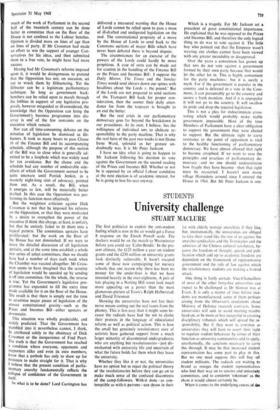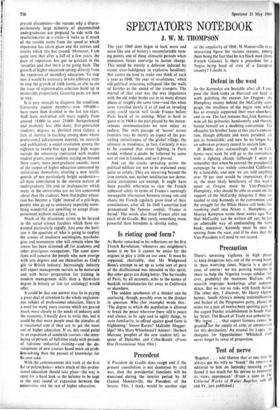University challenge
STUDENTS STUART MACLURE
The first politician to exploit the anti-student feeling which is now in the air would get a Force 8 response on the Enoch Powell scale. The dockers would be on the march to Westminster before you could say 'Cohn-Bendit.' In the pre- sent climate, the £125 million a year on student grants and the £230 million on university grants look distinctly vulnerable. It hasn't escaped some of those now campaigning for nursery schools that one reason why there has been no money for the under-fives is that we have invested heavily in the over-eighteens. A pair of tots playing in a Notting Hill street look much more appealing on a poster than the most glamorous picture of Essex's Ralph Halberstadt and David Triesman.
Showing the universities have not lost their nerve means sorting out the real issues from the phoney. This is less easy than it might seem be- cause the radicals have had the wit to clothe their protests in the language of educational reform as well as political action. This is how the small but genuinely revolutionary core of activists have gathered support from a much larger minority of discontented undergraduates who are anything but revolutionaries—just dis- enchanted with university life and uncertain of what the future holds for them when they leave the university.
Whether they like it or not, the universities have no option but to reject the political theory of the revolutionaries before they can go on to make much sense of the confused discontents of the camp-followers. With-it dons—as con- temptible as with-it parsons—can throw in their lot with elderly teenage anarchists if they like, but, institutionally, the universities are obliged to take their stand like the rest of us against the anarcho-syndicalists and the Trotskyites and the admirers of the Chinese cultural revolution, be- cause the freedom of thought, speech and pub- lication which add up to academic freedom are dependent on the framework of representative government and the rule of law against which the revolutionary students are making a frontal attack.
One thing is fairly certain. Vice-Chancellors of most of the other forty-five universities can expect to be challenged as Dr Sloman was at Essex. It is only a matter of time before inci- dents are manufactured, some of them perhaps arising from the Observer's revelations about Ministry of Defence research contracts. Some universities will seek to avoid meeting trouble head on, or be more or less successful in creating disciplinary tribunals which will spread the re- sponsibility. But if they want to continue as universities they will have to assert their right to regulate student behaviour by virtue of their function as university communities and to apply, unashamedly, the sanctions necessary to carry this through. It may be that increased student representation has some part to play in this. But no one need suppose this will buy off student militants. The radicals are waiting to _ brand as stooges the student representatives who find their way on to senates and university committees, and to condemn 'tokenism' as the sham it would almost certainly be.
When it comes to the underlying causes of the
present discontents—the reasons why a dispro- portionately large minority of uncommitted undergraduates are prepared to side with the revolutionaries in a crisis—it looks as if much of the trouble stems from the speed at which expansion has taken place and the stresses and strains which this has caused. Moreover, I am quite sure that after a lull of a few years, the pace of expansion has got to quicken in the 'seventies and that there is no going back. The growth of higher education springs directly from the expansion of secondary education. To stop now it would be necessary to take arbitrary steps to stop the growth of sixth forms, or else to see the issue of eighteen-plus selection build up to intolerable proportions. Growing pains are here to stay.
It is easy enough to diagnose the condition. University student numbers—now 199,000— have more than doubled in the last ten years. Staff have multiplied still more rapidly from around 11,000 to over 25,000. Inexperienced and probably less able dons; first-generation students; degrees as glorified meal tickets; a lack of interest in teaching among dons whose professional advancement depends on research and publication; a social revolution among the eighteen to twenty-five age group; high wages outside the university contrasted with modest student grants; more students staying on beyond three years; more post-graduate awards; more of the output of higher education consumed by universities themselves, creating a new intelli- gentsia of not particularly bright academics— all have contributed to the uneven texture of undergraduate life and to inadequacies which many in the universities are no less concerned about than the students. Now that higher educa- tion has become a 'right' instead of a privilege, people who go up to university expecting some- thing wonderful are unwilling to accept disap- pointment without making a fuss.
Much of the discontent seems to be located in the social science faculties which have ex- panded particularly rapidly. Just over the hori- zon is the question of who is going to employ the armies of mediocre sociologists, psycholo- gists and economists who will remain when the cream has been skimmed off for academic and other prestigious occupations. The same ques- tions will concern the people who now emerge with arts degrees and see themselves as God's gift to British industry. Increasingly industry will expect management recruits to be numerate and with better preparation for training in modern management skills than a third-class degree in history or law (or sociology) would offer.
It could be that one answer may lie in paying a great deal of attention to the whole unglamor- ous subject of professional education. There is a need for many more courses which are geared much more closely to the needs of industry and the economy. I hardly dare to write this, but it could be that more people need the stimulus of a vocational aim if they are to get the most out of higher education. If so, this could point to an expansion of sandwich courses—the inter- lacing of periods of full-time study with periods of full-time industrial training—and the de- velopment of new courses based more on prob- km-solving than the pursuit of knowledge for its own sake.
With the announcement this week of the first list of polytechnics—where much of this profes- sional education should take place—The way is open for a hard look at the balance to be kept in the next round of expansion between the universities and the rest of higher education.







































 Previous page
Previous page